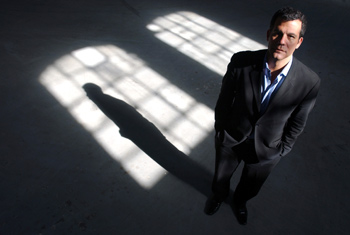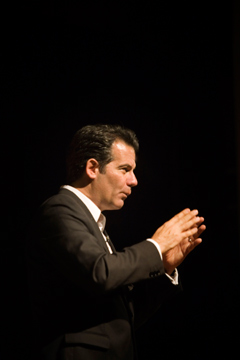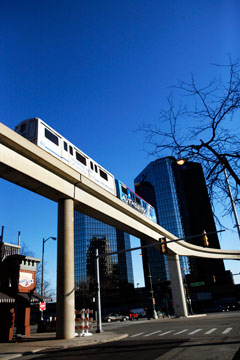Richard Florida on What Leadership Can Do for Your City
Who’s your city? Mr. Creative Class Richard Florida has a lot to say about why the cool kids live where they do, and what leaders can do to keep them here.
 In his new book, Who’s Your City, author Richard Florida says the creative economy is making where you live the most important decision of your life.
In his new book, Who’s Your City, author Richard Florida says the creative economy is making where you live the most important decision of your life.
The world is not just flat, but also spiky, he argues, as today’s key economic indicators—talent, innovation and creativity — are concentrated in strategic areas, not spread out evenly across the world. He brands the mega-regions in the world, including the Chicago-Pittsburgh corridor (Chi-Pitts), which is the third largest. And he ranks American cities for best places to live at different stages of life. Regions, like people, have distinct personalities, according to researchers. While New York and the West Coast have a concentration of those open to experience, our region is dominated more by conscientious folks.
From the wealth of place to the geography of happiness, Florida spins a new way of looking at our place in the world today. Is it for real? Or as Steven Colbert joked at the end of his humorous interview, which is in the book, is he simply a “gay, bohemian artist who just wants to sell his house?”
We recently interviewed the author — who went out of his way to point out that the good life can be found in places like Detroit.
So now that you were on the Colbert Report, does that preclude you from going on the Daily Show?
We wondered that, too! We’re working on that as we speak.
You write that the real source of economic growth comes from the clustering and concentration of talented and productive people and that today’s global economy is powered by a surprisingly small number of places. So what’s to become of the rest of the world?
Well, I’m scared, and one of the reasons I wrote this book is because I’m scared. The book is an empirical observation, the way the world is, not the way I wish the world would be.
Look, if we believe in this mythology that the world is flat, that anyone can plug and play and compete from anywhere, we’re missing the point that economic resources, resources required for invention, are really concentrating in a way that few people, even leading urbanists, understand.
More than 50% of us live in urban regions. These 40 mega regions (around the world) with less than 20% of the population account for about 2/3 of the world’s economic output.
What the book says is either we have to figure out a way as a world, which looks like a long shot given the bandwidth of our national politicians, to push up the valleys, or we have to understand that, like it or not, their (people’s) economic future may depend on their ability to move.
You talk about “the mobile” and “the rooted,” and give an example of the rooted in Detroit – those living in houses which aren’t worth as much now as they were when bought.  It’s interesting. I spent 17 years in Pittsburgh and my wife is from greater Detroit. We are big fans of rustbelts. I talk about in the book about how when living in Toronto, I feel like I’m home. I like older, urban cities. The thing isn’t that Pittsburgh and Detroit are not in “the valley,” they are really in one of the biggest mega-regions in the world: the Chi-Pitts mega region, the third largest in the world and the second largest in America.
It’s interesting. I spent 17 years in Pittsburgh and my wife is from greater Detroit. We are big fans of rustbelts. I talk about in the book about how when living in Toronto, I feel like I’m home. I like older, urban cities. The thing isn’t that Pittsburgh and Detroit are not in “the valley,” they are really in one of the biggest mega-regions in the world: the Chi-Pitts mega region, the third largest in the world and the second largest in America.
A valley would be someplace somewhere off the Middle East or Eastern Europe or in Latin America that is completely disconnected from a mega-region.
I just wanted to mention that the “Chi-Pitts mega-region” may have some places that are experiencing some level of economic transformation. But over the future, a place like Pittsburgh or Detroit is well positioned, even though they may have experienced some hard times in the past couple decades … And certainly, someone can lead a very, very, very thriving career in Pittsburgh or Detroit because you’re inside one of the world’s biggest mega-regions.
Help me better understand the connection between living in a powerful mega-region like Chi-Pitts but in a city in that region that’s in transition.
Chicago’s growth really sucked up all of the services and headquarters functions and lawyering and financial and accountancy that used to be done in the Detroits, the Pittsburghs, the Clevelands, the Akrons, the Toledos. Chicago has become in a way the business and financial center for the Chi-Pitts region, and it’s become extraordinarily expensive.
So, one can make quite a nice life in a Pittsburgh or in a Detroit if they find ways to connect to that Chi-Pitts mega-region.
How can a city in this mega-region, like Detroit or Pittsburgh or Cincinnati, better compete in the global economy? Is it a matter of amenities or mindset or both? First of all, I think they all have this great advantage, in a nearly 2 trillion dollar mega region which is one of the most innovative on the planet. They’re also close to the second largest mega-region on the planet, the number one in North America which is the Bos-Wash. (Boston-Washington) The question is how do they want to compete?
First of all, I think they all have this great advantage, in a nearly 2 trillion dollar mega region which is one of the most innovative on the planet. They’re also close to the second largest mega-region on the planet, the number one in North America which is the Bos-Wash. (Boston-Washington) The question is how do they want to compete?
It seems to me that what the strength of those places is they’re historical centers of innovation. … This is one of the greatest innovative and entrepreneurial centers in the world. They have probably the greatest cluster, one of the greatest clusters of universities, in the history of the planet. They’re producing phenomenal talent, but unfortunately, that talent leaves. So, in Rise of the Creative Class, I said the one thing that needs it to become more open-minded and tolerant. It needs to be more diverse and inclusive.
Some of that’s happening in certain parts of the region. More foreign people are moving in, though not enough, in the Cincinnatis and Pittsburghs. They’re becoming more open minded to the gay and lesbian population, though by no means enough. I don’t think it’s a question of making jazzier restaurants or hipper bike trails. I think it’s a question of being more open-minded.
Another thing the region suffers from is really poor leadership. And I think the reason that is, it really bears the imprint that as the economy is changing to newer things, away from manufacturing, the leadership still reflects that top-down, vertical, 1950s organization mentality so you get these conflicts between old-style democratic political machine and business-led organizations. Those conflicts become very dysfunctional.
Where is political leadership a model today?
We’ve certainly seen the transition in Denver with the election of John Higgins, and with John Norquist in Milwaukee. Even with Rich Daley. Maybe the model of a mayor for the Chi-Pitts region is a guy like Rich Daley who comes from a machine politics background, but has renamed himself as a mayor who can understand the future of the city, can understand the need to do new things, to support new economic sectors, be open minded in regard to young people, foreign-born people, the gay and lesbian community. What about the theory that it’s easier to affect change in a place like Pittsburgh, or Detroit or Cincinnati or smaller city? In our publication, we hear this a lot from people who return from major cities.
What about the theory that it’s easier to affect change in a place like Pittsburgh, or Detroit or Cincinnati or smaller city? In our publication, we hear this a lot from people who return from major cities.
I hear this from people at the absolute tops of their careers. First of all, the pull of home should never be minimalized. The fact, and you know I talk about this research and I take it with a grain of salt, every family member you leave behind or close friend costs you $100,000 in psychic income. And I say, I’d be the last person to put a dollar value on friendship and family ties. But if you’re leaving 6, 8, 10 people behind, that’s a lot of psychic income.
Second thing is, we heard this in all of our work over the past 10 years … people want to be in a place they can affect change.
This quote that I’ve always loved — this young man in Providence said to me, “Rich, I was living in San Francisco. So I can take San Francisco from an 8.5 to a 9.2? When I moved back to Providence, I had a place that is a four that I could make an eight.”
II think this ability to be involved, to be physically involved, to be socially involved, involved with your friends, your family, and be in a place that’s easy to navigate. The problem with New York or even Washington, where I lived, is that they’re not only hard to make it (change), they’re hard to navigate.
Glenn Meakem, founder of softwaremaker FreeMarkets (now Ariba) has said that he’s a contrarian. If someone tells him he has to go to New York to make it, he’ll make it in Pittsburgh.
I’m working with (E*Trade founder) Christos Cotsakos on his new start-up. The new start-up’s in West Palm Beach. Why? There were a lot of people looking for an exciting opportunity and it was easier to mobilize and build a community. People weren’t commuting two and a half hours each way to work. I think lots of people, lots of entrepreneurs are looking for those kinds of places.
 I think one of the things that’s important there is that the universities play a really big role. And in Detroit — if you look at my own rankings — look at the rankings for Ann Arbor and Lansing. Detroit lags behind Ann Arbor and Lansing. The future of Greater Detroit, and this is hard for people to understand, is in Ann Arbor and Lansing. And in that sense, Detroit may actually, on paper, have a better future with the breadth and extent of those two tremendous universities …, but the leadership mind has to wrap around it and say,
I think one of the things that’s important there is that the universities play a really big role. And in Detroit — if you look at my own rankings — look at the rankings for Ann Arbor and Lansing. Detroit lags behind Ann Arbor and Lansing. The future of Greater Detroit, and this is hard for people to understand, is in Ann Arbor and Lansing. And in that sense, Detroit may actually, on paper, have a better future with the breadth and extent of those two tremendous universities …, but the leadership mind has to wrap around it and say,
‘Look, it’s no longer going to be just a rebuilding of downtown. We have to build something really interesting and exciting around our major universities.”
Have you sent a copy of your book to Thomas Friedman (author of The World is Flat)?
No, I didn’t. Should I send it to him?
I think so. Don’t you two communicate in this spiky world?
You know it’s funny. We don’t live that far away and we have a couple of mutual friends, but we’ve never actually met. I would like nothing more.
Tom Friedman, in terms of someone that understands globalization, is better than anyone in the world. …
I don’t say the world is spiky, not flat, I say the world is both flat and spiky. And I think if you got us together, I think we’d agree on 90% of things.
Tracy Certo is the managing editor and publisher of Pop City, Model D’s sister publication in Pittsburgh.
Photos:
Richard Florida and The Colbert Report courtesy of www.creativeclass.com
Book Cadillac
People Mover
Photographs by Marvin Shaouni
Marvin Shaouni is the managing photographer for Metromode & Model D.




